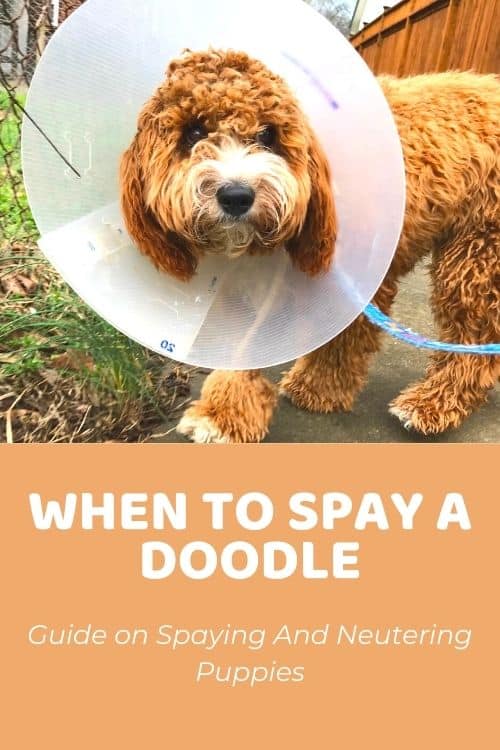If you’ve recently welcomed a baby Goldendoodle to your family, you’re probably wondering – when to spay a Goldendoodle? Or when to neuter a Goldendoodle? And if you haven’t given this topic any thought at all, we’re glad you made it here! Neutering a Goldendoodle is one of the most widely available procedures that many dog owners opt for. And for a great reason, too! In this article, we’re going to discuss everything about neutering a Goldendoodle, including the pros and cons of the procedure, the best age for neutering a Goldendoodle, the cost, and the recovery time. Let’s get started!
When To Spay A Goldendoodle: Introduction
Spaying and neutering are one of the most common surgical procedures that veterinarians perform on a daily basis. But what’s the difference between spay and neuter, anyway?
Spaying, a.k.a. ovariohysterectomy, is performed on female dogs. The procedure involves removing the female dog’s uterus and both ovaries. The surgery is done either by incisions made in the abdomen or as a less invasive laparoscopic surgery. Additionally, some veterinarians opt for ovariectomy, which is a simpler procedure by removing only the ovaries. Both surgeries are effective and remove the risk of unplanned pregnancies.
Neutering, on the other hand, is performed on male dogs. It’s often also referred to as castration and the procedure involves surgically removing the male dog’s testes. Although both spaying and neutering are performed under general anesthesia, neutering is a much simpler and less invasive surgery than a spay.
Why Should You Consider Neutering A Goldendoodle?
Spaying or neutering a Goldendoodle has various benefits starting from their health and ending with their behavioral development. Firstly, neutering a Goldendoodle can greatly reduce the risk of certain diseases and various forms of cancers, such as breast, uterine, and ovarian cancer in females, and testicular and prostate cancer in males.
Secondly, spaying a Goldendoodle can greatly reduce the prevalence of some unwanted behaviors. For instance, both male and female dogs tend to roam and even escape from their homes to mate. This can, of course, result in very dangerous situations like your pup getting lost or becoming stranded on a highway. Your pup’s health and safety should always come first! Additionally, unneutered male dogs tend to mark with urine. This is never a pleasant thing, especially if it happens around the house.
What’s more, as your Goldendoodle won’t be able to reproduce after neutering, you won’t be contributing to the overpopulation of dogs in the shelters and on the streets. Unfortunately, many dog owners refuse to get the procedure done, while letting their dogs mate with no regards of the consequences. Of course, this can often result in unplanned pregnancies, which require lots of time, effort, and money.
Firstly, you’ll have to provide your female dog expensive veterinary care throughout the pregnancy and delivery of the puppies. Secondly, bringing new puppies into the world can sometimes be very difficult and result in the death of the mama dog or the puppies. Lastly, finding good homes for the puppies is not an easy task. We recommend you leave breeding to professionals who put a lot of time and effort into breeding genetically sound dogs along with finding good homes for the puppies. In fact, many Doodle breeders include a clause in their adoption agreements that you will have to neuter your puppy at around 6 months of age.
Common Myths Around Spaying A Goldendoodle
As with anything, there are many myths surrounding the topic of neutering a Goldendoodle. None of them have any scientific basis, but nevertheless, many dog owners still believe them to be true.
One of the most common myths is that female dogs should have at least one litter before neutering. This misconception has followed the topic for ages. However, there’s no reason for a female dog to give birth to a litter. They won’t miss out on anything and they certainly won’t feel less like a dog for not giving birth. Similarly, many people think that purebred dogs can and should be bred. However, that could not be farther from the truth, as purebred dogs also end up in shelters and on the streets.
Another common misconception is that spaying will change a dog’s personality and affect their ability to learn and play. As we mentioned above, it can only affect your dog’s behavior so much that they won’t be as aggressive or eager to escape due to their urges to mate. Other than that, spaying or neutering has no effect on their cognitive abilities nor personality.
There’s also the misconception that you can have your dog unneutered, as long as you keep them inside the home. However, they will still feel the urge to mate, which can result in aggression, attempts to escape, marking with urine, and overall decrease of their quality of life.
Some other common myths include the surgery being too costly or that it can lead to obesity. Again, neither of these misconceptions is true, as neutering is one of the most widely available routine procedures at a reasonably low cost. In terms of the risk of becoming overweight, it’s usually due to inappropriate diet and caloric intake.
The Best Age To Neuter A Goldendoodle
When should I neuter my Goldendoodle? At what age should I neuter my Goldendoodle?
In terms of when to spay a Goldendoodle, it should always be done at an appropriate age. You shouldn’t get your pup fixed too young, but not too old, either. Of course, if for some reason your dog hasn’t been fixed and they’re well into their adult years, you should get the procedure done ASAP.
But what about younger Goldendoodles and puppies? Well, the recommended age for getting your dog neutered is around 6 months of age – typically, after the dog has experienced puberty. The American Animal Hospital Association (AAHA) has set useful timelines for when you should neuter your Goldendoodle:
| Small Breeds (below 45 pounds as an adult) | Large breeds (above 45 pounds as an adult) | |
| Spaying | Before anticipated heat cycle, usually around 5-6 months of age | Until their growth stops, around 5-15 months of age |
| Neutering | 6 months of age | Until their growth stops, usually around 9-15 months of age |
Naturally, we always recommend you consult with your veterinarian, so they will be able to fully examine your dog and propose the most appropriate time for your pup.
Cost Of Spaying A Goldendoodle
How much does it cost to spay a Goldendoodle? Spaying and neutering a Goldendoodle usually costs around a few hundred dollars. It depends on your location, veterinary clinics in your area, or if there are public agencies near you who provide neutering at a lower price. The cheapest options through public agencies can cost as low as $50, but you can typically expect to pay around $200 and upwards to $500 at your local veterinary clinic.
Risks And Benefits Of Neutering A Goldendoodle
Although we’re all for neutering your Goldendoodle, we cannot stress enough how important it is to do so at an appropriate age. Neutering a Goldendoodle has many benefits on their health, behavior, and preventing unplanned pregnancies. As we mentioned above, unneutered dogs can become agitated and even aggressive while in heat. In fact, male dogs can smell female dogs in heat even a mile away. So, if you don’t want any male dogs lurking in your backyard, you might find spaying a feasible option.
However, there are some common risks included with the procedure. These include:
- Any surgery performed under general anesthesia comes with a set of risks. However, complications rarely occur and they might be able to be detected before the operation with blood work and a thorough vet exam.
- Infection on the incision site. The symptoms include smelly and thick discharge from the wound, opening of the incision, or swelling and bulging.
- Early neutering at an inappropriate age (before sexual maturity) does increase the risk of certain health conditions, such as joint disorders like hip dysplasia, delayed closure of growth plates, and increase in certain types of cancer.
Goldendoodle Neuter Recovery
As neutering and spaying are surgical procedures, your pup will experience some downtime after the surgery. We can typically expect a Goldendoodle’s neuter recovery to take about 14 days or 2 weeks, but some pups might recover slightly longer than that. During this time, you should tone it down with exercise like jogs and walkies, but you can still take your pup out for bathroom breaks. You should also avoid giving your dog a bath and avoid leaving them alone right after the surgery.
In addition to that, you might have to go to a follow-up vet exam for the removal of the stitches and for your veterinarian to check if your pup has healed properly.
When To Spay A Goldendoodle: FAQ
Will Goldendoodle Calm Down After Being Neutered?
Spaying or neutering a Goldendoodle is widely regarded as a procedure that helps dogs calm down. Having your pup neutered helps reduce their natural urges to mate, which can often lead to aggression, marking with urine, and dogs wanting to escape and wander to mate.
Does Neutering A Goldendoodle Work?
Spaying or neutering a Goldendoodle absolutely does work! It’s one of the most common surgical procedures that veterinarians perform on a daily basis all across the country (or the world, for that matter). Not only does it calm down dogs who exhibit unwanted behaviors while in heat, it also eliminates the chance of unplanned pregnancies and you won’t be contributing to the overpopulation of dogs.
When To Spay A Goldendoodle: Conclusion
To conclude, although many dog owners nowadays know why neutering is a necessary and extremely helpful procedure, it’s still surrounded by many myths and misconceptions. All in all, the benefits far outweigh the risks associated with the surgery, as long as it’s done at an appropriate age. If you’re considering when to spay a Goldendoodle, we recommend you consult with your veterinarian for the proper plan of action you should take.
The information on this page is for informational purposes only. It is not intended to be a substitute for qualified professional veterinary advice, diagnosis, or treatment. Always seek the advice of your veterinarian or other qualified animal health provider with any questions you may have.











